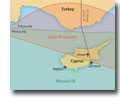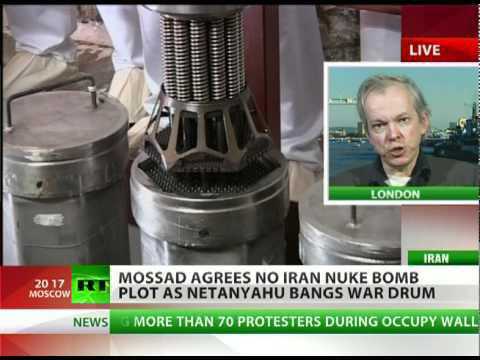I strongly believe that the time is right for Turkey and Israel to mend their critically important bilateral relationship which has suffered a precipitous decline since 2010. With the Middle East in turmoil as a result of the Arab Spring, the perilously unfolding crisis in Syria, the concerns around the Iranian nuclear program, the recent expansion of the Netanyahu government and the fact that the continuing and increasing level of bilateral trade relations between Turkey and Israel remains unaffected by these developments, all suggest that restoring their bilateral relationship now will serve the national strategic interests of both former allies. The question is, will Israel and Turkey recognize the potential gains they can both reap once they remove any obstacles standing in the way of rapprochement, knowing that full collaboration at this time is central to a regional stability that directly impacts their respective national security concerns?
Coupled with other significant developments, perhaps the most alarming issue at this particular time is the turmoil in Syria, in which Turkey has taken a strong and principled stand against the continuing carnage inflicted by Assad’s regime. Prime Minister Erdogan has made it clear that Bashar Assad and his cohorts must step down from power in order to end the crisis. Turkey shares a more than 800 kilometer (510 mile) long border with Syria and is deeply involved in Syria as it continues to provide humanitarian aid, shelter the refugees and host the Syrian National Council, the main opposition to the Assad regime. Israel, for its part, has prevented potentially greater conflagration by carefully and quietly monitoring the situation while taking no provocative action to keep the calm, which provided Turkey the necessary space to serve as the main power broker to oppose Assad with a sense of empowerment from the Arab League. The new political order that emerges in Syria will have a tremendous effect both on Israel and Turkey. By virtue of being neighbors of Syria, both have unique national interests in dealing with post-Assad Syria in a manner that will ensure regional stability and enhance their short and long-term strategic and security interests.
Moreover, the general regional uproar resulting from the Arab Spring has dramatically shifted the power relations from the status quo ante. There has been a diminution of the bilateral relations between Israel and Egypt, which has been the pillar of regional stability since the signing of the Camp David Accords in 1979. At the same time, Turkey’s stature in the region has grown immensely due in part to the high popularity of Prime Minister Erdogan, his position on Syria, and his stance on the Israeli-Palestinian conflict. Turkey’s strong position on Syria, in particular, has mitigated the impression that Turkey favors and panders to Islamists and demonstrated that is able to take a more balanced approach that has alleviated some of Israel’s earlier concerns. As a result, Turkey has emerged as an attractive interlocutor and model for the Arab world while deepening Israel’s isolation. The projected continued regional instability requires that both countries seek a renewed strategic partnership to handle the unpredictable nature of the region’s upheaval.
Israel’s hawkish stance against Iran’s nuclear program has dramatically increased regional tension as the world powers continue to work toward a peaceful resolution to Iran’s nuclear ambitions. As long as there is continuing conflict between Israel and Iran, however, Turkey, who is just as concerned over Iran’s nuclear program, can play an important role to diffuse the tensions. Although there is growing tension between Ankara and Tehran over the fate of the Assad government, Turkey is still on speaking terms with Iran, enjoys some influence and could exert a degree of pressure on Tehran to show more flexibility in conjunction with the negotiations between Iran and the P5+1 in Baghdad, which resumes May 23rd. Turkey has been strongly resistant to implementing sanctions on Iran, a position that has run contrary to Israel’s hard-line stance. But since Turkey dreads the prospect of an Israeli attack on Iran’s nuclear facilities and would certainly seek to prevent it, both Israel and Turkey have mutual interests in engaging in constructive dialogue that could reduce the regional friction regarding Iran’s nuclear program from which they can both greatly benefit.
The conflicts existing between Turkey and Israel, however, remain serious but can be ameliorated provided they set emotions aside and instead concentrate on the larger picture in rapidly changing times laden with unpredictable hazards. Turkey has taken, for good reason, a very strong position against the Israeli settlement program, especially in light of the recent decision by the Netanyahu government to retroactively legalize three West Bank outposts. Turkey has continued to criticize Israeli policies in the West Bank and the blockade of Gaza. Furthermore, Turkey blocked Israel’s participation in the upcoming NATO Summit in Chicago on May 20th and the Mediterranean Dialogue Group, both of which are linked to Israel’s refusal to offer a public apology for the Gaza Flotilla incident, during which eight Turkish citizens (and one Turkish-American) were killed by Israeli commandos.
While Israel, on the other hand, has avoided doing or saying anything provocative in recent months against Turkey, there is still a residue of resentment against the Erdogan government for lashing out against Israel whenever the opportunity presents itself. Israel does have its share of mistakes but it too seeks to bring an end to the sad Marmara episode in order to resume its alliance with a country that is now enjoying greater influence, is a close ally of the US, a powerful member of NATO and a neighbor of Israel’s three most sinister enemies: Syria, Lebanon and Iran. There is a growing sense that both sides want to preserve the prospect of restoring their relationship that existed before the diplomatic breakdown. In this regard, the United States has been urging both sides to move toward reconciling their differences, since the future stability of the region depends largely on full cooperation between the two most powerful nations in the area.
What might certainly further encourage rapprochement between the two countries is the fact that even though diplomatic relations, military exchanges and tourism from Israel to Turkey have been reduced to historically low levels, trade relations between them have reached new heights in 2011-2012. In addition, there is a tremendous level of technical collaboration, specifically in the biochemical field, while Turkish businessmen still see Israel as a place to trade with and in large part, see Israel as a place to learn from Israeli expertise. To be sure, from every indication both countries want to maintain viable trade relations to provide a solid foundation on which they can rebuild strong diplomatic bilateral relations as well.
The other significant development is the recent decision by Prime Minister Netanyahu to expand his coalition government, which now commands 94 out of 120 Knesset members and thereby strengthen his grip on power to an unprecedented degree. The move offers Netanyahu a great deal of political confidence to face challenges by smaller parties on any range of issues where there is disagreement. Of particular significance is the upcoming second year anniversary of the Gaza Flotilla Raid on May 31st, 2010, which effectively broke off relations between Israel and Turkey. Nearly a year ago, both sides succeeded in reaching an agreement where Israel would apologize for the incident, compensate the victims, and allow Turkey to send food stuff and materials for civilian consumption to Gaza.
There was strong dissent within the cabinet over Israel’s possible acquiescence and apology. Foreign Minister Avigdor Lieberman’s threat to withdraw from the coalition was enough for Netanyahu to back down from signing the agreement. Now that Netanyahu commands an overwhelming majority in the Knesset, he can actually revive this previous agreement and offer the apology that Ankara has been demanding all along without fear of Lieberman’s departure. Turkey has said time and again that once such an apology is made, Ankara will resume full diplomatic relations, including the exchanging of ambassadors. Now that Netanyahu is operating from a position of strength, he can make such a concession, especially since he agreed to the original language of the document that contained an apology. There is no better time to do so than right now.
Instead of recalling the tragedy that took place in international waters on its second anniversary, Israel should reconsider its position by meeting Turkey’s demands and putting the Marmara affair behind, which could go far beyond repairing the rift between the two former allies. Both sides stand to gain enormously from this necessary rapprochement. Israel will dramatically benefit by ending its isolation from the Muslim world and Turkey will gain likewise through its newfound assertiveness as a regional power.
The death of any one person at any time, in any place and under any circumstance, is unfortunate. Why not express an apology for lives that were lost and move on? This would not be seen as a sign of weakness but one of strength of conviction. It would not be a victory for Turkey but a victory for the human spirit that transcends the hour and brings nations together. The time is now.





